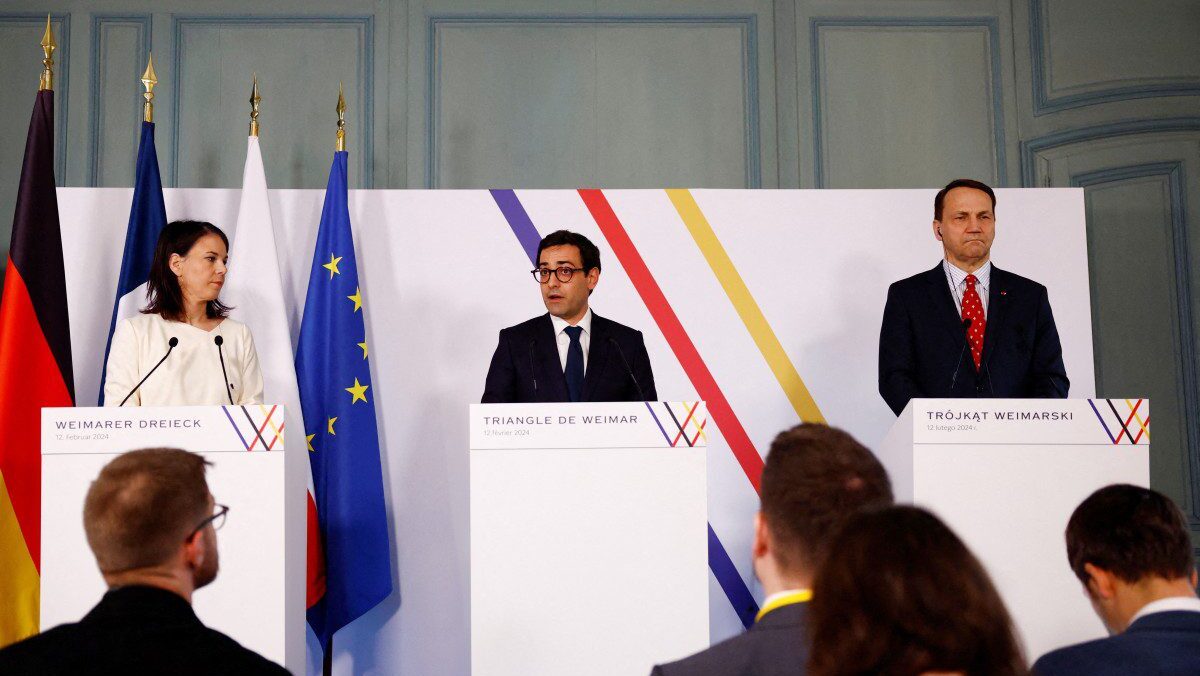
Weimar Triangle foreign affairs ministers (left to right): Annalena Baerbock (Germany), Stephane Sejourne (France), and Radoslaw Sikorski (Poland).
Photo: Sarah Meysonnier / AFP
The so-called Weimar Triangle—an informal cooperation between Berlin, Paris, and Warsaw—has jointly called on the EU to do more to combat foreign influence and disinformation, including creating a centralized “EU media platform” and boosting communication about the benefits of the EU, according to a statement given to Politico.
The three member states’ permanent representatives, also known as EU ambassadors, pitched their ideas to their colleagues at Tuesday’s (May 21st) General Affairs Council in Brussels, which is preparing the agenda for July’s major European Council Summit.
According to the sources, the Weimar Triangle’s proposals include establishing a Brussels-administered “European media platform” to police media content across the bloc; boosting joint communications about the benefits of being EU members; giving out additional funds for ‘media literacy,’ especially in more ‘problematic’ member states, as well as better coordination between member states on countering foreign influence campaigns.
The Council did adopt certain, more general priorities in the fight against foreign interference on Tuesday. These include the need to “step up action to monitor” interference attempts, maximize the use of established mechanisms and tools, and continue cooperating with online platforms, civil society, and fact-checking NGOs (which, ironically, are the primary drivers of the U.S.’ foreign influence).
The Weimar Triangle’s more long-term proposals, however, correlate with the European Commission’s similar ambitions to police online content, although Brussels’ plans already have a much larger scope.
During her keynote speech at last week’s Copenhagen Democracy Summit, Commission President Ursula von der Leyen promised to set up a whole new EU body to counter foreign influence under the catchy name “European Democracy Shield” if she wins a second stint at the helm of the EU.
In von der Leyen’s vision, the Democracy Shield would be tasked with detecting and removing online disinformation—using the censorship tools established by the EU’s flagship Digital Services Act (DSA)—as well as “inoculating” EU citizens against malign influence by teaching them how to recognize threats.
While foreign influence and disinformation are undoubtedly an existing threat, especially during election season, the initiative also has a clear party-political dimension that the Commission doesn’t even want to hide. ‘Disinformation,’ more often than not, is simply whatever Eurocrats don’t want people to hear.
“We have seen far-right politicians and lead candidates from AfD in Germany in the pockets of Russia,” von der Leyen said in her speech. “They are selling their souls on Russian propaganda outlets and videos.”
The idea that all conservative MEPs might be Russian proxies is part of a coordinated campaign from the Left to discredit the entire political Right ahead of June’s EU election, even though it has hardly any proof to back up its claims.
Von der Leyen’s comment was a direct reference to the two-month-old controversy around the right-wing news site Voice of Europe, which Czech authorities allege is the center of a Moscow-created foreign influence operation. Prague claims that the site paid conservative MEPs—including one in the AfD—to repeat Kremlin talking points in interviews, but has so far failed to present any evidence despite repeated calls from the accused parties themselves, which led some to believe the whole scandal was a hoax to hurt conservatives’ electoral prospects.
But despite the lack of public evidence, the EU mainstream and the European Commission have hijacked the narrative and have been consistently using Voice of Europe as proof that the conservative parties in Brussels (ECR and ID) are compromised. Measures against the news site were even included in the EU’s upcoming 14th sanctions package against Russia, further legitimizing the established narrative.
Clearly, any new centrally administered EU body—the Democracy Shield or the Weimar-proposed “media platform”—will have the same purpose. At the very least, it’s hard to trust Brussels to create a truly non-partisan agency to police media content when violating free speech (by shutting down conservative events or excluding right-wing candidates from debates) is commonplace in the EU capital.
